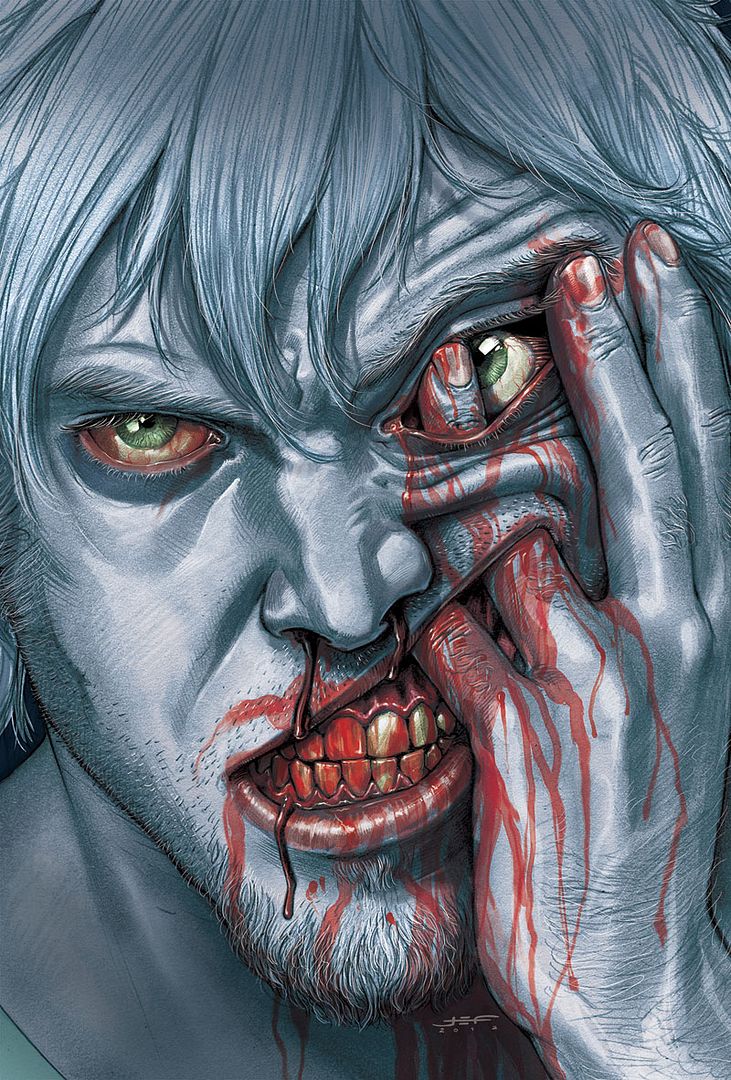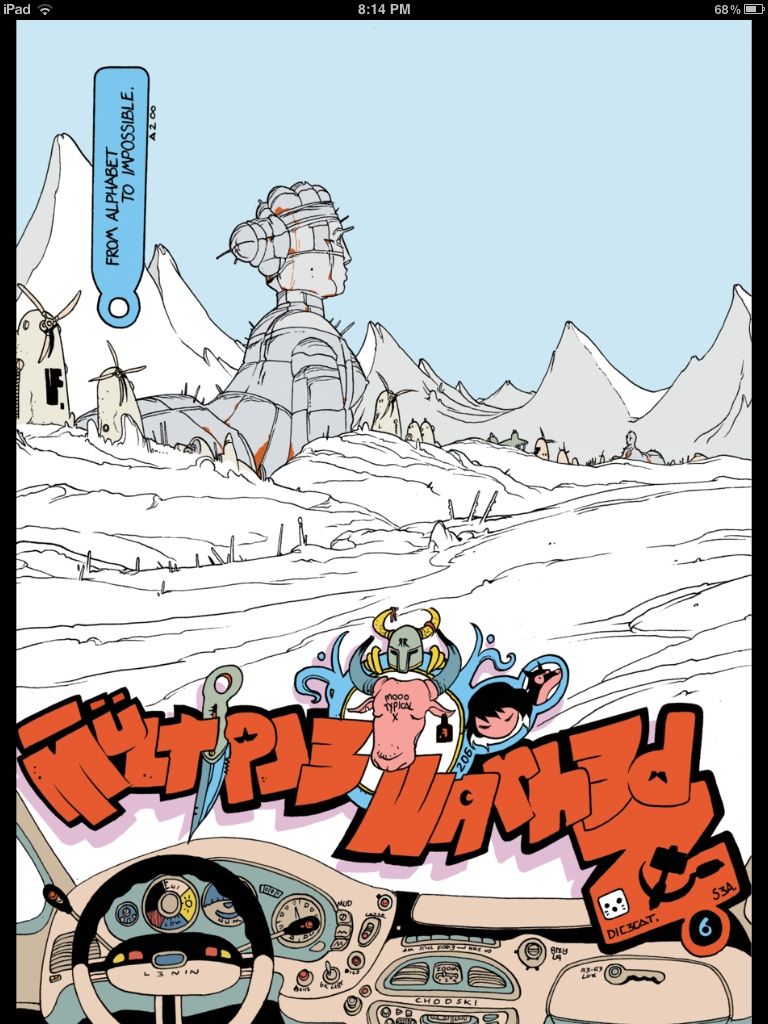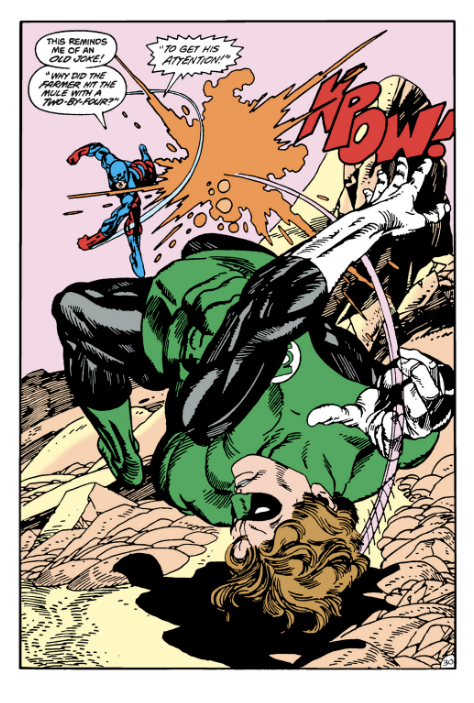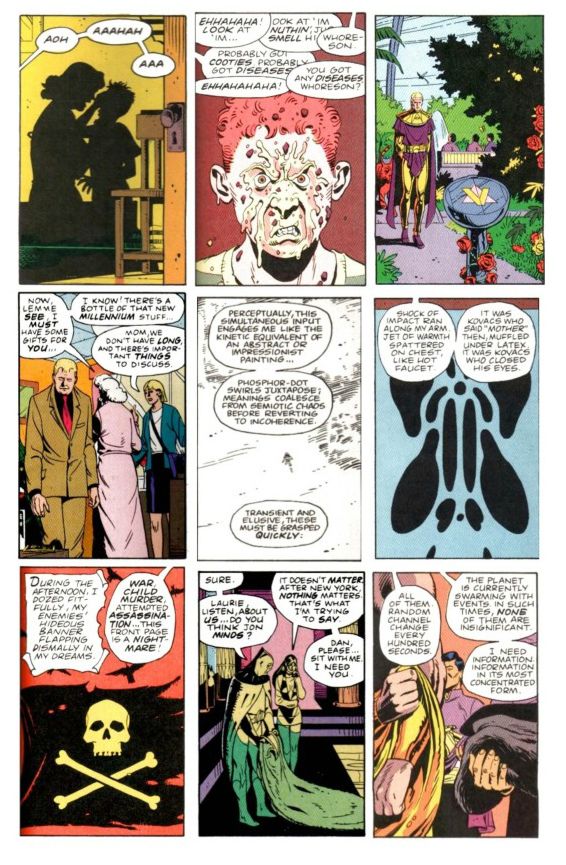Wait, What? Ep. 110: Let It Snow, Let It Snow, Let It Snow
/ One of the two delightful pieces of art made for us by the impressively talented Garrett Berner (a.k.a. The Mighty Gar)
One of the two delightful pieces of art made for us by the impressively talented Garrett Berner (a.k.a. The Mighty Gar)
It's our last podcast of the year! Yes, after this two hour and ten minute Whatstravaganza, you get a nice two week vacation from our wee voices nattering on and on, answering your questions, picking apart your comics. Finally! Some peace and quiet for your holidays! Doesn't that sound pleasant?
Anyway...after the jump! More art! Lots of links! A hastily assembled and incomplete "Best of" list! And also: Show Notes!
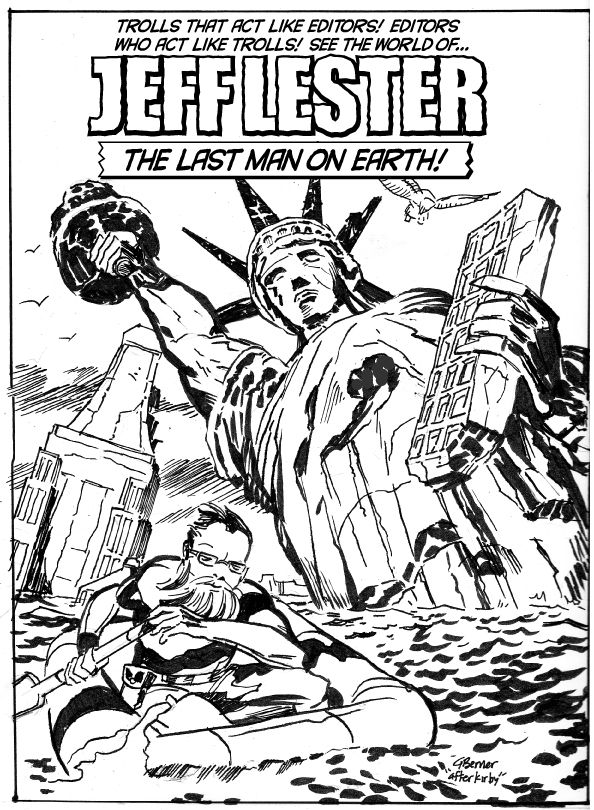 Another great piece by Gar. We owe that man an "Eternals" debt of gratitude! (Ha,ha! See, because Kirby did The Eternals and...?)
Another great piece by Gar. We owe that man an "Eternals" debt of gratitude! (Ha,ha! See, because Kirby did The Eternals and...?)
All right, so as you may recall, last episode we answered four questions and had something like forty-seven questions remaining. Did we get through them all in one two hour podcast, you may be asking...?
Well, no. but we did manage to do the following:
0:00-8:03: We open with a delightful reading from Graeme of a well-loved holiday sketch. Then we go on to discuss Graeme's emerging status as a Canadian broadcasting superstar, internet deadlines, just about everything but comics. Because (as you know by now), that's the way we roll.
And you know, as long as I'm posting multimedia links, I wanted to draw your attention to a few things, in case you missed them: a short but sweet interview from Al Kennedy of the famed House to Astonish podcast over at The Beat!; an all-superhero sketchcast from The Irrelevant Show with most of the sketches written by the brilliant Ian Boothby (his Superman vs. The Parasite sketch struck a special silver-age nerd sweet spot for me); and the two Cheat Sheets Abhay has done to date, featuring voice work from the brilliant Tucker Stone and yours truly, the first on the 1960s
Oh, *and* speaking of Tucker Stone, I know I've clued some of you guys in to the great Comic Books Are Burning in Hell podcast, but I should also mention that if you like Wait, What? and you like movie nerdery, you should check out Travis Bickle on the Riviera, a fantastic movie podcast by Tucker and Sean Witzke that is always entertaining and funny and smart. I really should've hyped it sooner but I am Lay-Zee (Kryptonian scientist and wastrel).
Whew! So between this episode and all of the above, you should have enough to keep you busy during our two week absence, right?
8:03-10:35: But here's some comics talk--about Action Comics #15 by Morrison, Morales, and crew.
10:35-12:53: (Graeme also really liked Doctor Who #3 by Brandon Seifert & Philip Bond.)
12:53-17:10: Because it was a free comic on Comixology, we also discuss the first issue of the Star Trek/Dr. Who Assimilation2 comic by Tony Lee and J.K. Woodward.
17:10-44:32: Question! from Matthew Ishii (and Dave Clarke): “'Re: Leinil Yu overselling emotion in scenes. I was at a talk by Colleen Doran (comic writer and artist on a bunch of things) who criticized the comics industry as a whole trending towards this, because of the impact of Jack Kirby and Steve Ditko. You guys are all about Kirby, do you think this is a fair comparison.' I'd be interested to hear you guys talk about that, as a guy who loved manga and hated superheroes his entire childhood." We also talk about the current situation with Gail Simone and DC. We also bleep ourselves. (Maybe for the first time ever?) We also talk more about what the hell DC is thinking? Also, Graeme gives a New52 pitch for Scooter that is, frankly, stellar. And since he's been rereading the Fourth World Omnibus, we also discuss Kirby (because how can we not?) and his amazing run on Jimmy Olsen. And also Geoff Johns. (Oh, god. I really should've broken all these out into individual time-stamp entries. Sorry!)
44:32-53:27: Question! from Matthew Ishii: "Q: What comics are famous and considered classics, when the writing was mediocre but the art elevated it? Likewise, name some comics where the art was pulled from good to great by the coloring or the inking."
53:27-54:19: Non-Question! from David Oakes:
"'Waiters' Are Fans, Forgo Long Explanation"
54:19-57:35: Question! from Dan Billings: "Why is it so hard to drop books? I am heading into the shop today and realize I am reading 16 books – money-wise, that’s crazy and quality-wise, there are not 16 good books coming out this week. Or is this something I should address with my therapist instead?"
57:35-1:02:56: Question! from Ian Brill: "This has nothing to do with comics but I want to ask Graeme something I’m surprised it took me this long to figure out to ask. When you’re writing career started was it difficult to switch to the American spelling of words? Do you sometimes find your original education colouring your spelling choices, leading you to have to apologise to your editors?"
1:02:56-1:03:18: INTERMISSION ONE (of one!)
1:03:18-1:14:43: And we're back and right into… Question! from moose n squirrel: "What’s the deal with Alan Moore and rape? […] Somewhat related to this, a second question: if all the horrible sexist shit in comics and comics culture were swapped out with horrible racist shit, do you think comics readers would take the same ho-hum attitude towards it all? Like, if Alan Moore put scenes of, I don’t know, Black people being lynched in all of his comics, would people just shrug and say, “oh well, that’s Alan Moore, when you read an Alan Moore comic you’re bound to get some gratuitous lynching” the way they seem to do with his gratuitous rape, or would they see some line being crossed? Is it the case that comics culture is grossly sexist and racist to boot? Or is there a reason why it’s sexist but not (as) racist?"
1:14:43-1:17:35: Question! from T: "Also, do you think such a think as “house styles” still exist at the Big 2, either for whole companies (e.g. a “Marvel Style”) or for lines within companies (e.g. the “Vertigo style,” the 90s X-Men Harras house style, the Weisinger Superman house style, the Schwartz Bronze Age Superman House style, the Schwartz Silver Age House style), etc. If there are current house styles at the Big 2, what are they? Are they art-based house styles, like when people used to say there was a “cartoony art” house style in the Berganza Superman books? Is it a writing-based house style, like people claim Ultimates had in the beginning. Is it a comprehensive art/writing house style like the 90s X-books had? If there are no more things as unique house styles at the big 2 anymore, what do you consider to be the last example of a true, unique “house style” in the Big 2?"
1:17:35-1:19:38: Question! from T: "Oh, last question: Does the abysmal state of Jeph Loeb’s writing for the past year show that he’s gotten somehow much worse than he used to be, or is it proof that his earlier, praised work was overrated and is now due for critical reappraisal?"
1:19:38-1:25:31: Question! from T: "Okay, Marvel or DC promises you they will hand over the reins of your all-time favorite character or concept to a certain writer for a guaranteed 100-issue run, and this run will not only be the only place to read about your favorite character or concept, but no one else will be allowed to write said character or concept during this duration, this 100-issue run will have zero editorial edicts and the writers will have total free rein over the concept and can do whatever they want. Also, if you don’t accept this deal, there will be no comics, adaptations, guest appearances, or anything with your favorite character or concept for a 10 year period. Yes, a 10 year moratorium, even if we’re talking Batman, Justice League, Avengers, or Wolverine. (Okay, so this is a far-fetched, impossible concept I know, but just go with it). Your choices are:
1) Jeph Loeb 2) Brad Meltzer 3) Chuck Austen 4) Mark Millar 5) Brian Bendis
Which one do you trust the most with your favorite character/concept?"
1:25:31-1:32:09: Question! from Ben Lipman: "What’s the deal with people acting like Alan Moore is the only writer with rape in his works? Isn’t he just working within the tropes/archetypes of the genres he works in? Isn’t it weird to ignore all the acts of violence in his works, to only focus on the sexual violence? Moore has a rep for writing about rape, despite that sex fills his works and is mostly shown shown as a positive life-affirming experience – I would say positive sexual encounters far outweigh the negative one’s in his works. Is it perhaps the fans/commentators who are in fact fixated on rape? Did JG Ballard have to put up with this shit? What would it take for Jeff to end his financial boycott of Marvel? What steps do they need to take to get him back?"
1:32:09-1:32:56: Question! from Adam Lipkin: "It seems that the inevitable “Wait, What?” Drinking Game has to have a rule requiring listeners to take a drink every time Jeff talks about editing something out and then never actually doing so. But after the last episode, there needs to be a rule for times when he talks about editing something out and then actually does so (but still tells us something was cut). Is that a sip, a chug, or some other amount?"
1:32:56-1:37:04: Question! from gary: "Graeme, if you had to replace Jeff with another host from world of comics (writers, artists, editors, etc), who would you replace him with and why? Jeff, if you had to replace Graeme with another host from the world of comics (writers, artists, editors, etc), who would you replace him with and why? And together, if you had to take on a third person on this podcast, who do you think would fit into the rhythms of your podcast?"
1:37:04-1:40:52: Question! from gary: "If you were given free reign of What If, what would be the titles of your first 3 “What Ifs”? Also, if you were given free reign of Elseworlds, what would be your first 3 genre mash-em ups?"
1:40:52-1:42:32: Question! from Tim Rifenburg: "I was curious if you guys specifically use a pull list for certain books or do most of your buying “off the rack”. Would you be buying less books if you did not have a pull list?"
1:42:32-1:45:12: Question! from Matthew Murray: "In light of recent news what are some lost gems of Vertigo? What uncollected series should we be searching back issue bins for?"
1:45:12-1:50:08: Question! from Brock Landers: "Also, coming from the generation who entered comics when the Wolfman/Perez Teen Titans and Claremont/Byrne X-men were the two biggest books, I had this notion. Have DC horribly mishandled the Teen Titans franchise since Wolfman/Perez or was it just a product of it’s time and it doesn’t have the same conceptual vitality and depth as the X-men?"
1:50:08-1:52:50: Question! from gary: "What comic book by Matt Fraction is most like a Waffle Cone? What Matt Fraction comic book is least like a Waffle Cone? Please elaborate on both."
1:52:50-1:54:13: Question! from Kag: "Where should we, as comic readers, be hoping Karen Berger lands? At an existing mid-major (IDW/Dark Horse)? At an existing “art house” (Top Shelf/Koyama)? At a major publishing house (Random House/Penguin)? Or do we want her launching a startup?
1:54:13-2:11:43: Then, instead of going on to the next question(!), we decide we should turn to Jeff's cobbled together "Best of/Last Minute Comic Book Gift List," cobbled together in part from my introductions. As mentioned herein, this list is far from exhaustive and there are so many tremendous works out this year I didn't read that I almost didn't put together a list.
Anyway, because I want you to have access to something like a list from me, here it is:
- Empowered Vol. 7 by Adam Warren: Didn't get enough love this year I thought. The fight scenes in this book are master classes in comic book pacing and storytelling. Blew my mind.
- Action Comics #9 by Grant Morrison, Gene Ha & others: An amazing single-issue comic, a jaw-dropping act of bravado in a work-for-hire context, and a surprisingly persuasive defense of work-for-hire.
- Double Barrel by Zander Cannon and Kevin Cannon: If you have any kind of access to a digital comics reader, you should check out this great serialization/anthology/comic book clubhouse.
- Pope Hats by Ethan Rilly (issue #3): Not cheap, but a beautifully illustrated story about a real and recognizable world that is all the more enchanting for it.
- Saga & Multiple Warheads: Two strangely similar-but-different casual sci-fi epics, one from Brian K. Vaughan & Fiona Staples, the other from Brandon Graham (whose other title Prophet just missed making this list).
- Marvel: The Untold Story by Sean Howe: Not a comic but an amazing (and amazingly ambitious) history of Marvel Comics.
- New Deadwardians by Dan Abnett and I.N.J. Culbard: A spiffy little read and will make a great trade.
- The Voyeurs by Gabrielle Bell: Turns out this left Graeme cold, but I really loved this collection of quasi-dreamlike autobio comics.
- Bandette by Paul Tobin and Colleen Coover: Digital-only, and the three issues to date are gorgeous, funny, and fun.
- Popeye #3 by Roger Langridge and Tom Neely: A fantastic single issue where all of the love and craft by Langridge and Neely manages to transcend any of my reservations about work-for-hire being done in the style of the original creator.
- The Lovely Horrible Stuff by Eddie Campbell: Only $4.99 if you buy it digitally (which is how I read it) and the way Campbell uses various digital tools made the book feel like one of the first real "digital" comics I'd ever read. Disquieting and fascinating.
- Gisele issues of Archie (esp. Archie #636 by Gisele): I love Gisele, and apparently I love gender-flipped Archie and gender-flipped Jughead. Yikes.
- American Barbarian and Final Frontier by Tom Scioli: Read one in print, the other online [link: ] and I adored them both. Of course, I'm probably the perfect audience for Scioli's strongly Kirby-influenced style but I really admire how he tries to find a balance with pastiche work that is neither post-ironic nor knowingly arch. It's super-sophisticated in its primitivism, I think.
- The End of the Fucking World by Charles Forsman: An addictively dark mini-comic that uses its format for maximum effect. Forsman's a guy I can't wait to see more of.
- King City by Brandon Graham: Realized the trade of this only got collected this year, so some people may not have discovered it until this year…maybe you haven't discovered it yet? If so, you should: it's a canny and addictive blend of slice-of-life and sci-fi adventure comics.
Other stuff Jeff dug: The Valiant reboot; Shonen Jump Alpha; 2000 AD Digital; the digital reprints of Crying Freeman over at Dark Horse Digital; the second and final volume of the Kamandi Omnibus by Jack Kirby; and the amazing graphic novel adaptation of Donald Goines' Daddy Cool by Donald Glut and Alfredo Alcala.
Graeme agrees with some but adds three I didn't mention:
- Dustin Harbin's Boxes;
- The Crackle of the Frost by Lorenzo Mattotti and Jorge Zentner; and
- The Nao of Brown by Glyn Dillon
2:10:45-End: Closing Comments! Best wishes for the holidays and the New Year! Join us in 2013 for more fun, yeah?
Oh, and right--the podcast itself! That would be helpful to include, right? I mean, it's on iTunes and everything, but that's not everything, is it? No, not by half, it's not! Feel free to warm your Christmas ears below:
Wait, What? Ep. 110: Let It Snow, Let It Snow, Let It Snow
And as always, we hope you enjoy...and thanks for listening!


